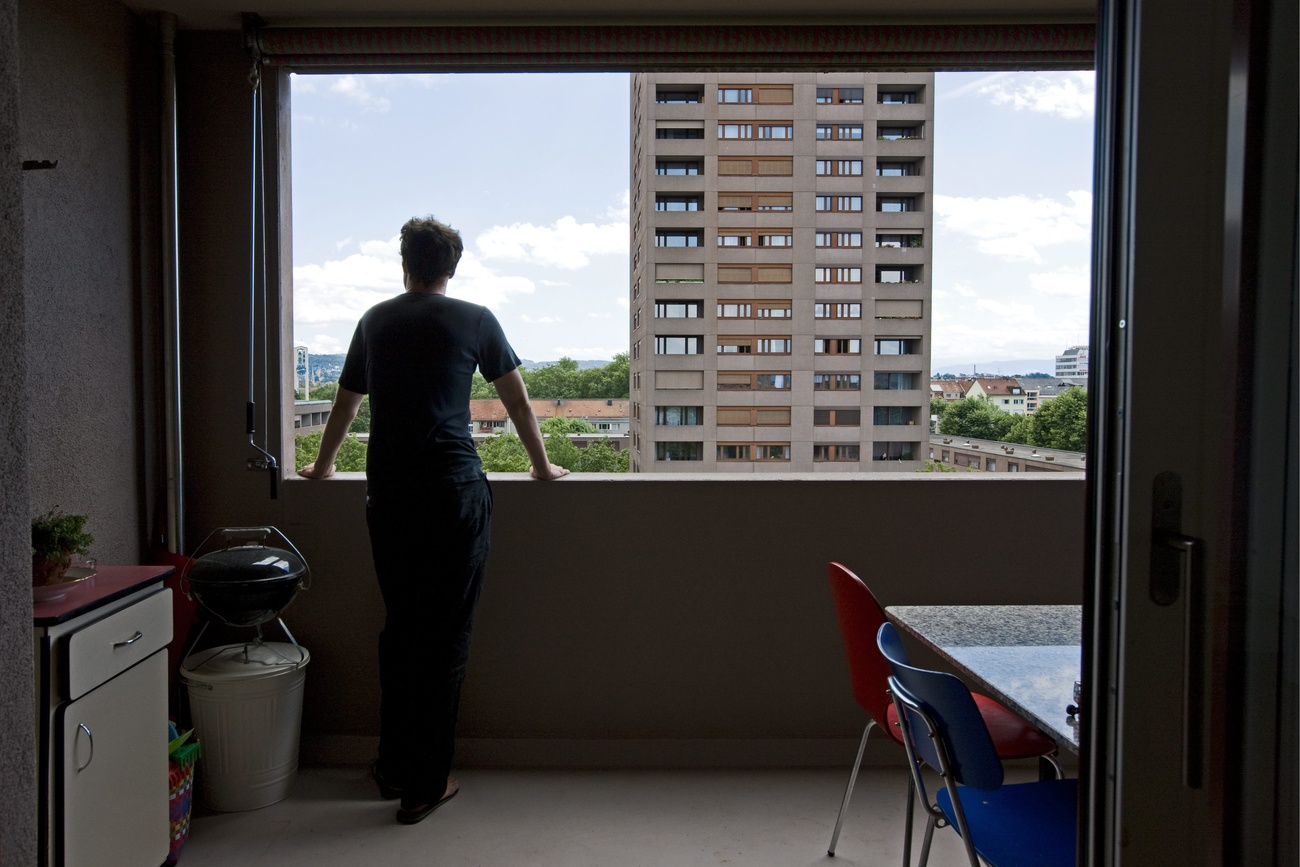Seven lessons from the November 2024 Swiss referendums

With the defeat of a plan to boost the Swiss motorway network, the government has suffered its third major setback at the ballot box this year. A crisis of trust in authorities is being exploited to the full by the left.
1. The Swiss Abroad were surprisingly keen on motorway expansion
Overall, the four issues put to the vote on November 24 were of somewhat limited interest to the Swiss population abroad. At most, the two reforms to tenancy law concerned people who still own property in Switzerland and rent it out, or tenants who want to sublet while abroad.
The really surprising thing about the Swiss Abroad was their high backing for the proposed motorway expansion, according to an October survey: at that time, 60% of the diaspora were in favour – 10 percentage points more than the Swiss population overall.
By the time of the second survey a few weeks later, intentions had declined overall, but the pattern was the same: support for the motorway projects among the Swiss Abroad was still higher (50%) than among Swiss-resident citizens (47%).
The analysis of how the diaspora actually voted in the final ballot is still to come; but the fact that it seemed – for once – to be less environmentally-conscious than the population at home is in itself remarkable.

More
Swiss reject plans for bigger motorways and extra rights for landlords
A few possible explanations: during occasional visits back to Switzerland, the Swiss Abroad might be more aware of any changes, and they might then compare what they see with the situation in their country of residence. Perhaps some Swiss Abroad find Swiss motorways to be more congested than those they use on a daily basis elsewhere.
In general, there is a larger political trend towards a loss of interest in ecological issues, with people giving more priority to safety and prosperity. Are the Swiss Abroad set to follow this trend even faster than the population at home?
If true, it would mark a paradigm shift. But for the moment, when it comes to the Swiss Abroad voting habits, we can’t see anything more than two oscillations on a seismograph; it would take a lot more to trace a definite line.
2. Voters listened to experts over the government
Faced by a proposal coming from the authorities, opponents of the motorway expansion plans were not in an easy position. The “yes” camp also had more resources at its disposal for the campaign: over CHF4 million ($4.47 million), the highest budget for a ballot item declared in 2024, according to provisional figuresExternal link from the Swiss Federal Audit Office and an analysis by the University of Bern. Opponents had CHF2.7 million. Some 93% of newspaper advertisements concerning the motorway vote were in favour of it.
The opposition were also faced with a Swiss electorate traditionally reluctant to restrict car traffic and which has – until now – almost always supported the development of road infrastructure; the exception was the Alpine Initiative, 30 years ago.
And yet on Sunday a majority of voters said “stop”. In this context, it’s interesting to note that expertise prevailed, which is not so often the case. Opponents of the plan, backed by transport specialists (350 of whom spoke outExternal link against the project), succeeded in getting across the counter-intuitive – but scientific – argument that increasing motorway capacity would eventually lead to just as much or even more traffic jams.
The government, for its part, failed to provide factual accuracy on a number of points. In particular, it was accused of withholding information on the real environmental and health impact of transport, of not being transparent about the consequences of the project for fuel pricesExternal link, and of peddling misleading arguments about road safety. This may have instilled doubt in an electorate that was initially sympathetic to his cause.

More
Why cars still reign supreme in ‘rail-nation’ Switzerland
3. Voters swayed by the prospect of lower health insurance premiums
The proposed plan for standardised financing of outpatient and inpatient healthcare services began the campaign with two major handicaps: its complexity and its lack of transparency.
Not only was the idea by government and parliament difficult for voters to understand, but the impact it was unclear. Worse still, supporters and opponents had a diametrically opposed view of what it would mean: the former promised a reduction in health insurance premiums, while the latter denounced a sell-out project that would even cause premiums to rise.
All the ingredients were therefore in place for the project to suffer the same fate as the reform of occupational pensions, shot down by voters in September.
However, there was another decisive factor: a growing number of Swiss households, which bear a quarter of healthcare costs, are struggling with constantly rising premiums. Despite the uncertainties, the promise of lower insurance bills was enough to win over a majority.
4. Tenancy rules: too much, too fast
Any parliamentary bill has to be drawn up on the basis of a minimum amount of consensus if it is to have any chance of surviving the threat of being challenged to referendum.
This implicit rule of Swiss semi-direct democracy was not respected by parliament – during the previous legislature – in September 2023, when it decided on two changes to tenancy law: to ease rules around landlords terminating leases early in order to use the property for their own purposes, and to tighten conditions around subletting.
At the time, even the right-wing majority government opposed this reform, deeming the current rules to be sufficient. Forced by law to campaign in favour of the two issues, Economics Minister Guy Parmelin did the minimum.
Similarly unconvinced, Swiss voters on Sunday said no. In a country where 60% of the population are renters, the attempt to force through new rules was seen as another sign of how disconnected parliament is from the reality of most people’s lives.
The housing shortage, particularly acute in major Swiss cities, puts tenants at a disadvantage compared with property owners. Although the reforms proposed by the conservative camp may have seemed pragmatic, the powerful tenants’ lobby Asloca, with the help of left-wing parties, managed to narrowly swing the vote in their favour.

More
Voters to decide if Swiss landlords need extra rights
5. Trust in authorities has hit a low
Switzerland is renowned for the high level of trust enjoyed by its authorities. However, it is currently experiencing a crisis of confidence: for the first time, more people distrust the government (47%) than trust it (42%), according to the gfs.bern polling institute.
The “no” vote on motorway expansion is yet another setback for the government and parliament, after having already lost in two major public votes this year.
During the Covid-19 pandemic, the public were largely supportive of governmental policy. However, confidence started to erode as the health measures ended. The climate of mistrust has since had an influence on voters’ opinion, which was clear during referendum campaign: over time, the tendency to vote “no” increased for all four issues, an unusual pattern for projects proposed by the government.
There are several reasons for this. A turning point was when voters accepted the introduction of a 13th annual pension payment in March – against the government’s advice. Since then, there has been much talk about the authorities not understanding the concerns of the population.
The rejection in September of a reform of the occupational pension system, after the news of miscalculations in financial forecasts for the Old Age and Survivors’ Insurance system, both dealt a further blow to public confidence in the institutions.

More
Fiasco for democracy? Switzerland miscalculates by billions
6. The left is on a roll
Left-wing parties and unions are riding a wave of ballot box success. The Social Democrats have come out on top in nine of the 12 popular votes so far in the current legislature. The left marked a first victory at the beginning of the year with the 13th pension payment, followed by the rejection of the occupational pension reform. Pierre-Yves Maillard, a Social Democrat parliamentarian who also heads the Swiss Trade Union Federation, has played a central role.
This time however, political heavyweight Maillard, the Social Democrats, and the trade unions suffered defeat on the uniform financing of healthcare services. However, the results of the other three projects confirm the trend: while the left doesn’t always get its way in parliament and government, it is increasingly successful with people’s initiatives and referendums.
Given that they often challenge parliamentary bills at the ballot box, the left-wing parties are supplanting the right-wing Swiss People’s Party as something of a national opposition party. This is no accident. There is a clear desire on the left to focus on mobilising support at the ballot box.
It is worth noting that while the Swiss electorate swung rightwards in the 2023 federal elections, it has tended to favour the left in votes held during the current legislature – good news for the left, but a trend that also risks creating deadlocks in parliament. The traditional consensus-driven approach in Swiss politics does not exactly correspond to this opposition party mechanism.
7. Polarisation has arrived in Switzerland
An increasing polarisation in politics can now also be observed in Switzerland. Parties furthest from the centre of the spectrum are becoming more forceful and more vocal in how they express their views. This referendum campaign, which was particularly driven by parties from the sides of the spectrum, and the close results of the vote on Sunday, confirm this development.
The acceptance by voters of the healthcare financing project shows that parliament at least still manages to sometimes reach a famous Swiss compromise. However, even debates on this issue became increasingly marked by a left-right divide over the course of the campaign.
More
Edited by Mark Livingston; translated by DeepL/dos

In compliance with the JTI standards
More: SWI swissinfo.ch certified by the Journalism Trust Initiative










You can find an overview of ongoing debates with our journalists here . Please join us!
If you want to start a conversation about a topic raised in this article or want to report factual errors, email us at english@swissinfo.ch.